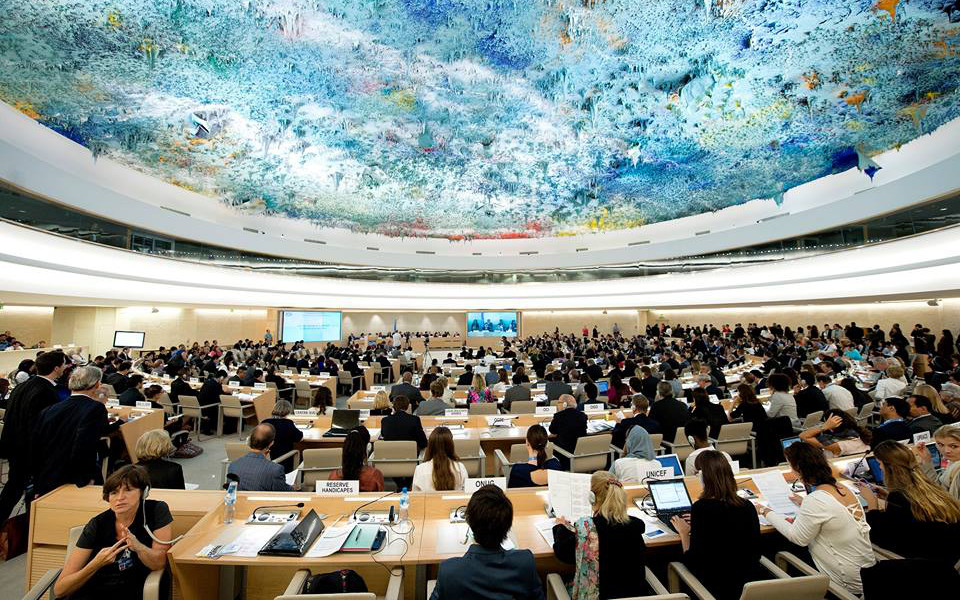21 September 2017 – Today, the Government of Bahrain formally adopted the outcome of its third Universal Periodic Review (UPR) cycle at the United Nations (UN) Human Rights Council (HRC) in Geneva, fully or partially accepting only 139 out of the total 175 recommendations. Americans for Democracy & Human Rights in Bahrain (ADHRB) deeply regrets the government’s decision to accept even fewer recommendations during this cycle, and urges the authorities to seriously engage with the UPR process. We additionally call on the international community to take further steps to ensure the Government of Bahrain works to meet all of its stated reform commitments, including by renewing efforts to pass a resolution addressing the kingdom’s human rights crisis at the HRC.
Bahrain entered its third UPR cycle on 1 May 2017. Eighty-two state delegations engaged in the debate, which yielded more than 200 individual proposals that were grouped into 175 recommendation clusters ranging from improving religious freedom to halting executions; from strengthening women’s rights to protecting freedom of assembly and association; and from eliminating torture to ending the practice of citizenship revocation.
Bahrain’s third UPR cycle is its second review since authorities violently suppressed the country’s mass peaceful protest movement in 2011, initiating a widespread crackdown on basic freedoms that has intensified in the years since. Following the government’s failure to implement a narrower set of 26 recommendations issued by the Bahrain Independent Commission of Inquiry (BICI) in 2011, the second UPR cycle in 2012 resulted in the participation of 67 states – representing more than one-third of the UN’s membership – with 63 issuing another 176 recommendations, of which the kingdom fully or partially accepted 158.
However, in the five years between the second and third UPR cycles, the Government of Bahrain failed to fully implement any of these recommendations, making perceivable progress on just two. It made no effort to institute 76 percent of the proposed reforms, and rejected 10 percent of them outright. In recent years, Bahrain’s authorities have even acted to contravene recommendations that had previously seen some degree of implementation, such as those to prohibit military trials for civilians.
During the third UPR cycle, many states built on these unimplemented recommendations, calling for the Government of Bahrain to allow greater freedom of expression; end the persecution of civil society actors like journalists and human rights defenders; eliminate discrimination against the country’s Shia majority population; establish a moratorium on the use of capital punishment; and ratify outstanding human rights protocols, like the optional protocol of the Convention Against Torture.
Meanwhile, states also raised concerns about alarming new developments in Bahrain. Several states, including Germany, the Czech Republic, Belgium, Denmark, and the United States urged the government to curb its use of arbitrary deprivation of citizenship as a reprisal against civil society actors, a practice that has stripped hundreds of their citizenship since 2012. As the government vastly expanded its legal authority to revoke the citizenship of Bahrainis in the years since the second cycle, these recommendations represented the first international effort to address this practice through the kingdom’s UPR.
The third cycle also saw states that had previously declined to participate in Bahrain’s UPR issue recommendations for the first time. Though Honduras and Ghana did not take part in the 2012 review, for example, they offered third-cycle recommendations to end religious and cultural discrimination in Bahrain. The Bahraini government had narrowly interpreted related recommendations from its second-cycle to avoid addressing these forms of prejudice, but the new recommendations explicitly call on the authorities to cease violating religious and cultural rights like those of the kingdom’s long marginalized Shia majority community.
Not all states offered incisive and constructive recommendations, and the Bahraini government itself submitted a National Report that is misleading, vague, and incomplete. These failures were gravely exacerbated by the government’s reprisal campaign against Bahraini civil society actors attempting to engage with the international community, including widespread use of retaliatory travel bans and arbitrary detention. As a result of government interference, the number of independent Bahraini activists attending the UPR cycles dropped from 47 in 2012 to only 3 in 2017.
During Bahrain’s UPR adoption debate on 21 September 2017, the government announced that it had accepted 139 recommendations from its 3rd cycle, and rejected 36 recommendations based on their confliction with Bahraini laws, Sharia, or indicated that the recommendations would need further study. The government delegation also hailed that some recommendations had already been completed in the sphere of women’s rights, migrant worker’s rights and the right to development, yet civil society contends that effective implantation of these reforms still has yet to be seen. NGOs and civil society organizations raised wide-ranging concerns during the adoption debate regarding restrictions on free expression and assembly, political prisoners, torture in detention and acts of reprisals against civil society and political opposition. Bahrain’s response to the concerns raised simply cited to the kingdom’s deeply flawed legal and criminal code, raised accusations of terrorism against peaceful dissent, and raised objections over claims of sovereignty.
“Ultimately, Bahrain’s third UPR cycle saw an even stronger international effort to address the kingdom’s rapidly deteriorating human rights record than previous cycles,” said Husain Abdulla, ADHRB Executive Director. “Despite – or perhaps because of – the Bahraini government’s increasing mix of blatant repression and disingenuous PR, the international community stepped up to issue a strong set of recommendations to reverse the kingdom’s dangerous trajectory. Now that Bahrain has accepted at least some of these recommendations, the Human Rights Council must keep the pressure on and push the government to actually make progress, and on an urgent timeline.”
ADHRB calls on the Government of Bahrain to engage with the UPR process in good faith and to take genuine steps to implement the third cycle recommendations before the next review. We further urge the international community to use all tools at its disposal – including joint statements and resolutions at the HRC – to compel and monitor Bahrain’s institution of this reform package.





